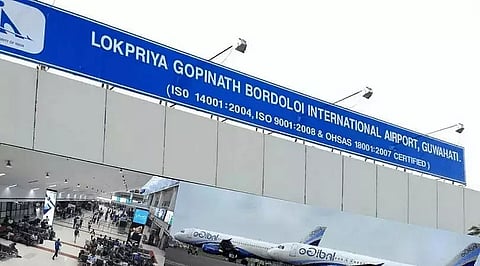
- Home
- Live Blog
- Breaking News
- Top Headlines
- Cities
- NE News
- Sentinel Media
- Sports
- Education
- Jobs

STAFF REPORTER
GUWAHATI: The Gauhati High Court has struck down a PIL seeking a prayer room for all religions at LGBI Airport in Guwahati.
The bench of Chief Justice Sandeep Mehta and Justice Kardak Ete, which was hearing the case, avers that no fundamental right of the petitioner is being breached by not providing a facility for prayer at the precincts of Lokpriya Gopinath Bordoloi International Airport, Guwahati.
Moreover, the bench maintained that it is in the domain of the government or the Airport Authority of India to decide whether such a facility is required to facilitate people accessing the airport. More so, the bench stressed, when the plea is for a religious facility.
The petitioner in the PIL case (64/2023) had urged the court that the passengers belonging to different religions, while travelling through Guwahati Airport, do not have access to any proper prayer room facility that exists in various other airports across the country like Delhi International Airport, Mumbai International Airport, Mangaloroo Airport, Agartala Airport, etc.
He also placed reliance on the judgements of the Supreme Court in the cases of the Durgah Committee, Ajmer Vs. Syed Hussain Ali and Ors., and Ratilal Panachand Gandhi vs. State of Bombay and Ors., and stressed that Article 25 of the Constitution of India guarantees the freedom of conscience and right to freely profess, practise and propagate religion not merely to the citizens of India but to every person.
The petitioner also referred to Article 26 of the Constitution of India and argued that the Constitution has guaranteed any religious denomination or section of it the right to establish and maintain institutions for religious and charitable purposes.
The bench, however, was of the firm view that Articles 25 and 26 of the Constitution of India give freedom to people of a particular denomination to profess a particular religion, to acquire movable and immovable property, and to administer such property in accordance with the law. However, the bench added, such rights cannot be stretched to the extent of a demand for setting up a dedicated prayer facility in a public place like an airport.
The bench was also not impressed "even for a moment" by the claim of the petitioner that prayer rooms are provided in some of the airports across the country and thus a similar facility should also be directed to be set up in the precincts of LGBI Airport, Guwahati.
The firm view was expressed that no litigant can be permitted to seek a direction from the court to the government to establish a dedicated place for professing religious practices in an airport.
The court's view was also that the High Court, while exercising the extra-ordinary writ jurisdiction conferred upon it by Article 226 of the Constitution of India, cannot be asked to interfere with any policy decisions of the Government.
"As a matter of fact, on going through the pleadings of the writ petition, we do not find any such averments therein that can convince the Court that the petitioner has been authorized or sponsored by the members of society at large to plead their causes in this writ petition branded to be a Public Interest Litigation. Hence, we neither find merit in the claim laid by the petitioner-in-person in this writ petition nor do we find that the writ petition espouses any public cause so as to grant the relief sought for," the Chief Justice ruled.
The writ petition was dismissed as being devoid of merit.
Also Watch;